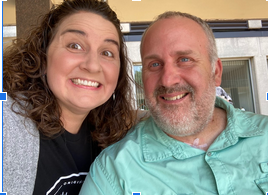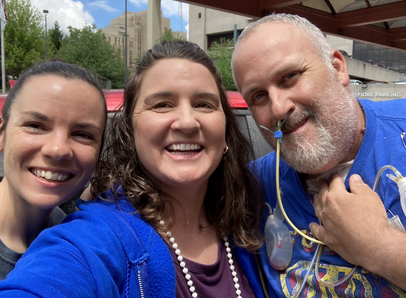At Andrew Potocki’s follow-up appointment 15 days after his surgery for an ameloblastoma in his jaw, Dr. Matthew Spector, MD, FACS, Division Chief, Head and Neck Surgical Oncology & Microvascular Reconstruction, opened the door and before Potocki could even see him, announced, “The margins are all clear! We got it all and you won’t have to worry about this anymore.”
Potocki appreciated the lack of small talk. “He told me what I needed to hear immediately,” he said. “That was HUGE for my wife and me.”
A 49-year-old high school science teacher from Fairview, PA (just outside of Erie, PA), the story of how Potocki found Dr. Spector and had his tumor removed has “crazy connections and coincidences” and is also a good example of the specialized work Dr. Spector does.
Diagnosis
Potocki’s only symptom was a tenderness between his bottom lip and chin on the left side of his face that he felt when shaving. On a Wednesday in February 2024, he asked his dental hygienist if his gums were receding or if he was experiencing pain that comes with getting older. The hygienist – who happens to be Potocki’s mother-in-law’s best friend – decided to take a panoramic x-ray to see what was causing the discomfort. Upon viewing the x-ray, she and the dentist approached and told Potocki they thought he might have either a traumatic bone cyst or some type of tumor.
As luck would have it, Potocki’s daughter was headed to Pittsburgh the next day to see their cousin, Dr. Shawn Marsh, an oral surgeon in Wexford, for a wisdom teeth consultation. The hygienist and dentist suggested that Potocki tag along for an evaluation. The following Monday, while Potocki’s daughter had her wisdom teeth removed, he had a biopsy done on his lower jaw. That weekend, Dr. Marsh was in Erie for a family function and delivered the biopsy results. Potocki had an ameloblastoma in his jaw that needed to be removed.
Finding Dr. Spector
In another example of crazy timing, Dr. Marsh and his brother – who is an oncologist in Pittsburgh – happened to be attending a national head and neck surgery conference the week after in Arizona. The hope was that they could do some window shopping and networking to find someone to help their cousin. One name on their list was Dr. Spector. Potocki was ecstatic, as Pittsburgh is only two hours away from Erie. He travels here dozens of times a year as he has a teenage son who plays travel hockey. “I am comfortable in the city AND I know that some of the best medical care in the world happens in Pittsburgh,” Potocki said.
Meeting Dr. Spector
Dr. Marsh and Dr. Spector had never met or heard of the other; Dr. Spector had only been at UPMC for about six months at the time. Dr. Marsh reached out to Dr. Spector, who replied within minutes telling Potocki to contact him to discuss being taken on as a patient. A conference call was set up with both physicians, Potocki, and his wife.
“The real telling moment, to me, was when I asked Dr. Spector how many of these “free flap” surgeries he does on average per year,” Potocki recalled. “I was expecting a number between 10 and 20. When he told me he usually does over 100 a year, I knew I had found ‘my guy.’ When Dr. Spector emailed me the surgical plans, I passed them around like a photo of a newborn baby. As a science teacher and self-proclaimed ‘tech nerd,’ I was in awe of the detail, planning, and specialization of the surgical plan. It totally blew me away! I had figured that there was a large, complicated plan involved, but I was still shocked by just how much was planned out.”
Surgery
Potocki’s surgery involved removing a segment of his jawbone and replacing it with a bone in his leg. Specialized guides and models were used to ensure his jaw would fit perfectly. His dental restoration was performed in the same operation so he would look normal right after surgery. “Given his young family, occupation as a teacher, and hobbies as a hockey player, this was important to him,” Dr. Spector said. Nerve grafting was also done at the time of surgery so Potocki would recover his sensation to the lip and jaw.
“Another challenging aspect is that these tumors are more difficult when they occur in the front of the jawbone, as opposed to the back or maxilla,” Dr. Spector said. “We had to carefully plan the surgery so that we could preserve the vital structures such as the tongue musculature and nerves.”

Surgery was around nine hours long. The eight days that Potocki spent in the hospital for recovery was the hardest thing he has ever had to do in his life. He had a couple of setbacks, including a bleed in his mouth two days after surgery. He underwent emergency surgery to stop the bleeding. That same night, there was a tornado warning. When he returned to his room, the view outside was “pretty spectacular.”
Recovery
Potocki’s jaw has never really been painful, and he has some numbness in his lower lip, which makes eating challenging. The skin graft on his lower leg is taking its time to heal. But Potocki is improving each day. “I know from being an athlete and suffering injuries in the past that if I adopt a mindset of ‘each day is one day closer to being back to normal,’ it helps me both physically and mentally along the way,” Potocki said.
As a former avid runner, Potocki developed a strategy he calls the “next mailbox” mentality. When training for a half-marathon, he always dreaded the 10–15-mile training runs. By setting shorter goals to focus on, he got through it. He adapted this to his recovery. The first “mailbox” was getting home. The next one was being able to stay for the day on his own without help. After that was going up the stairs. Every time he has done something post-op that he used to do prior to surgery, he counts it as another mailbox, another goal achieved. “I will never forget the impact of finally being able to shave a few weeks after surgery,” he recalled. “It was amazing to me how much it helped mentally and emotionally to once again be able to look like I did prior to the surgery.” Now the big thing is waiting to do his permanent dental implants so he can return to a normal diet. He has had seven months of soft foods that he is growing weary of. But he considers this just a little bump in the road on his way to the next mailbox.
Lessons Learned
Potocki has learned that he is stronger and more able to overcome things if he has a positive attitude. He knows that he has the greatest people in the world as part of his village. He tries on a daily basis to be a better, more grateful person during this process.
Finding the Right Doctor is Everything
“It’s difficult to put into words how much Dr. Spector has meant to me and how incredible he has been throughout the whole experience,” Potocki said. He has reached out to Dr. Spector numerous times, and he always responds quickly, which Potocki appreciates.

At that first post-op appointment, after Dr. Spector announced the good news, he had Potocki drink some water after not having any food or water by mouth in 16 days. While it was difficult to swallow the water, Potocki did it. Then Dr. Spector took out the feeding tube and removed four surgical drains. He asked if Potocki had tried walking without the boot. He hadn’t, so the boot was removed, and proclaimed unnecessary. Potocki was prescribed a liquid diet for a week or two and then soft foods. The whole event took about five minutes and made Potocki the happiest person in the world – “a huge mailbox for me,” he said. On the drive home, they stopped at a gas station where he got a vanilla protein shake. “I don’t think I’ve EVER tasted something so good in my entire life!” he said.
